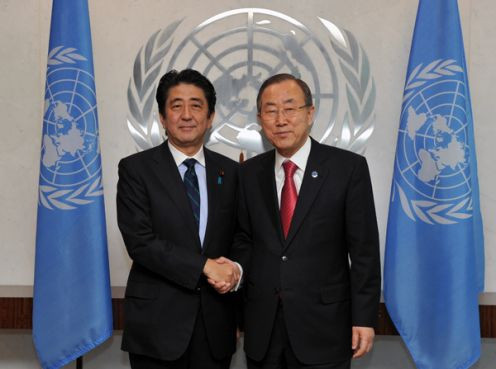Why should Japan join the United Nations Security Council?
(Baonghean.vn) - In his speech before the United Nations General Assembly, Prime Minister Shinzo Abe mentioned the case of Japan participating in the main decision-making body of the United Nations (UN).
 |
| Japanese Prime Minister Shinzo Abe and United Nations Secretary-General Ban Ki-moon. Photo: UN. |
“Japan seeks to become a permanent member of the Security Council and make contributions commensurate with that status… Japan has supported nation-building in many places. Now more than ever, Japan wants to generously share that experience,” Prime Minister Abe said. The plenary debate of the United Nations General Assembly entered its second day of work on September 29.
Following speeches by US President Barack Obama, Chinese President Xi Jinping, Russian President Vladimir Putin, and South Korean President Park Geun-hye on September 28, the following day it was Abe's turn to give a speech, presenting Japan's vision for the UN, ending with a request to allow Tokyo to hold a seat on the UN Security Council (UNSC).
Mr. Abe noted that Japan has been an active humanitarian aid provider. He has also pledged hundreds of millions of dollars to support aid projects around the world, from helping Serbia and Macedonia deal with Europe’s current migrant crisis to building water and sewage systems in Iraq. As an example of Japan’s impact on individuals, Mr. Abe cited the case of a mother fleeing violence in Syria, carrying a notebook provided by Japan to record her baby’s health.
The Japanese prime minister painted a rosy picture of the UN, despite its recent crises. In his speech, he largely avoided discussing thorny issues that have challenged the UN’s efforts to find solutions, from the Syrian civil war to the rise of the Islamic State (IS).
The only international hot spot mentioned in Mr Abe's speech was North Korea: "Japan will coordinate with relevant countries to find a comprehensive solution to outstanding issues including abductions, missile and nuclear issues."
Rather than stir up controversy by deepening the issues that have divided the UN, Prime Minister Shinzo Abe has kept the focus on the humanitarian consequences of crises, and what Japan is willing to do to address them. He has used these promises to argue that Japan would be a valuable addition to the UN’s top group.
First, Mr. Abe asserted that “Japan has firmly maintained its position as a peace-loving country” since the end of World War II. He pointed to Japan’s contributions to peacekeeping operations and its willingness to do more to close the gap between plans and operations on the ground. In this context, Mr. Abe mentioned Japan’s controversial new security laws, saying that such reforms would allow Japan to contribute to peacekeeping operations in a broader and more active way.
The head of state also stressed that Japan’s priority strategy for resolving international issues is to empower local people to “take charge” and “determine their own lives.” Referring to recent dialogues with African and Pacific countries, Shinzo Abe said: “Japan has always strived to become a country that actively listens to the voices of relevant parties.”
Mr. Abe concluded: “Holding high the banner of “Proactively contributing to peace based on the principle of international cooperation,” Japan is determined to reform the Security Council to transform the United Nations into an organization suitable for the 21st century, and then, as a permanent member of the Security Council, fulfill its responsibilities to make greater contributions to world peace and prosperity.”
The prime minister is not alone in arguing for UNSC expansion. The heads of state of the G4 – Brazil, Germany, India and Japan, all of whom want permanent membership in the UNSC – met in New York on September 26. All four leaders agreed that it was time to continue pushing for UNSC reform. According to the Times of India, the Japanese prime minister said: “Since the G4 meeting in 2004, the world situation has changed. Now there is a high momentum for change.”
However, the G4 will find that the push for membership will be as difficult as ever. Many other countries, including Pakistan, China, and South Korea, oppose the G4 getting permanent UNSC membership while Brazil, Germany, India, and Japan are very determined about it.
Thu Giang
(According to Diplomat)
| RELATED NEWS |
|---|






